Respecting the environment
Environmental and climate issues are of key importance for us at Arion Bank. We want to ensure that we have a comprehensive overview of the environmental impact of our day-to-day activities and to minimize the negative aspects. We are aware that the greatest influence the banks can have on environmental and climate issues is through lending and investment and we take this responsibility seriously.
.jpg)
In December 2019 the Board of Directors adopted an ambitious environment and climate policy designed to further underscore Arion Bank’s commitment to leading by example in environment and climate issues. The policy sets out the mapping of the Bank’s environmental impact and the importance of the Bank’s having a positive impact on other components of the value chain.
Environment and climate policy
We aim to be a role model on environmental and climate issues and to minimize greenhouse gas emissions and the negative environmental impact of our activities. Man-made global warming is one of the greatest threats facing us today and we want to contribute to efforts to ensure that Iceland can meet its obligations under the Paris Climate Agreement and other local and international environmental and climate agreements, which includes limiting global warming to well under 2°C, preferably 1.5°C.
Banks perform a vital role in providing funding for progress and Arion Bank wants to be a force for good. Our focus is on financing projects on sustainable development and green infrastructure and we will evaluate our loan portfolio according to green criteria and set ourselves ambitious targets in this respect.
We also require our suppliers to take into account the environmental and climate impact of their activities. When comparing similar offers from suppliers, environmental and climate considerations will be decisive in our decision. The Bank’s goal is to reduce emissions of carbon dioxide and other greenhouse gases from our activities by at least 40% by 2030 and to carbon offset all these emissions.
We are setting ambitious targets and will publish the results of our progress in areas where we have the greatest impact, such as buying, our own activities and the services we provide to our customers. We endeavour to improve our employees' knowledge and understanding of environmental issues and to support our customers' journey towards a green future in accordance with the UN Sustainable Development Goals.
Targets adopted by the Board of Directors
- In 2020 we will evaluate the Bank’s loan portfolio according to green criteria and establish targets in this respect.
- In 2020 we will adopt a policy on loans to individual sectors which takes into account environmental and climate considerations.
- From 2020 we will ask our main suppliers about the environmental and climate impact of their activities.
- Before the end of 2022 we are going to measure the carbon footprint of the loan portfolio and subsequently set ourselves a goal of how to reduce the footprint up to 2030 in accordance with the Paris Climate Agreement.
- From 2023 the Bank will no longer buy vehicles which do not run on 100% renewable energy.
- We intend to increase the ratio of sorted waste produced by the Bank to 90% by 2023.
Highlights of environmental accounts for 2019
Detailed results of the environmental accounts can be found in the table of non-financial information. The main results are presented below visually.
Total emissions of greenhouse gases from our own operations, i.e. from vehicles and business premises, have decreased by 29.3% since 2015 (Scope 1 and 2). Of this total, total emissions from vehicles decreased by 26.5% and from business premises by 31.6%. The main opportunity to further reduce emissions from own operations is to stop buying fuel for vehicles. As stated earlier the Bank will not buy vehicles from 2023 unless they run on 100% renewable energy. This is part of the Bank’s effort to reduce emissions from own operations by at least 40% by 2030.
Greenhouse gas emissions from vehicles (scope 1)
Greenhouse gas emissions from business premises*
We have set ambitious targets on reducing greenhouse gas emissions by 2030, and every year we will take measures to carbon offset our activities.
This year we are teaming up with Kolviður to plant 5,000 trees to offset emissions for 2019.
Total emissions from vehicles and business premises with targets to 2030 (without offsetting)
Total emissions from acquried services (scope 3 without offsetting)
Enhanced data collection has enabled us to improve the quality of information collected on acquired services (Scope 3). In 2015-2018 international flights, flights by contractors, flights with international airlines, taxi journeys and data destruction have been added to the Bank’s environmental accounts, which partly explains why recorded total emissions of greenhouse gases from acquired services have increased.
Emissions from flights taken by the Bank have increased for the second year in a row. In 2018 the Bank was listed on the stock exchanges in Iceland and Sweden and number of journeys abroad increased significantly as a consequence.
Greenhouse gas emissions from flight (scope 3)
The 2019 environmental accounts show that the Bank sorted 68.5% of the waste produced by operations but that a considerably lower proportion, or 48%, was sent for recycling. The lower recycling ratio between years is mainly due to the fact that the process used by Sorpa, the waste disposal company which receives organic waste from the headquarters, did not function properly in 2019 and this waste was sent to landfill during the first eight months of the year and did not undergo the correct process.
Arion Bank’s goal is to increase the ratio of sorted waste to 90% by 2023.
Sorted waste
Arion Bank’s environmental account for 2019 can be found in the section on non-financial information. Data and information in the environmental accounts are applicable to 2019 and relate to the core activities of Arion Bank, not its subsidiaries. Data from 2015-2018 is presented for comparison. 2015 is the benchmark year for the Bank’s efforts to reduce greenhouse gas emissions from its operations by 2030.
Data for the Bank’s environmental accounts has been effectively collected using data streams via Klappir Green Solutions. Information on waste collection, heating and electricity from places of work shared with other companies, e.g. in shopping malls, is excluded.
As more data streams were added for 2019, it was decided to recalculate data for the periods 2015 to 2018 to include the latest information. Consequently, there are some discrepancies if these accounts are compared with previous environmental accounts.
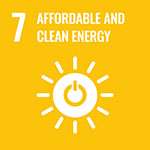
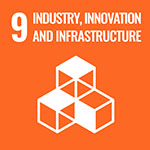
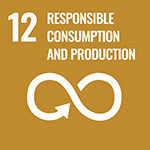
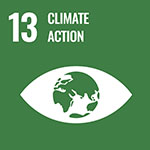
UN Sustainable Development Goals and UN Global Compact
The Bank’s environmental goal to reduce the negative impact of its operations and value chain on the climate supports the UN's 13th sustainable development goal, climate action. The Bank’s environment and climate policy also supports goal 7 on affordable and clean energy, goal 9 on industry, innovation and infrastructure and goal 12 on responsible consumption and production. As a member of different organizations and a signatory to various commitments, both in Iceland and abroad, we are strengthening our cooperation in sustainable development.
The Bank’s actions also support goals 7 to 9 of the UN Global Compact, to which Arion Bank has been a signatory since the end of 2016.
Cooperation on environmental and climate issues
In September 2019 the Bank became a signatory to the United Nations Principles for Responsible Banking (UN PRB). These principles, presented during the autumn at the start of the UN General Assembly, align banking with international goals and commitments such as the UN Sustainable Development Goals and the Paris Climate Agreement. Arion Bank is one of the first banks to announce its support for the principles, with 130 banks from 49 countries signing up. By becoming signatories banks undertake to continuously increase their positive impacts while reducing their negative impacts on people and the environment and to be transparent about the implementation of the principles.
In 2019 Arion Bank and Kolviður reached an agreement on offsetting the carbon emissions produced by the Bank's activities. Kolviður will fix the carbon in plants and soil through soil reclamation and forestry to offset the carbon emissions resulting from the Bank's activities in 2019. Kolviður is expected to plant up to 5,000 trees for the operating year. This refers to emissions produced, for example, by vehicles used in the Bank's operations, its business premises, waste and business flights.
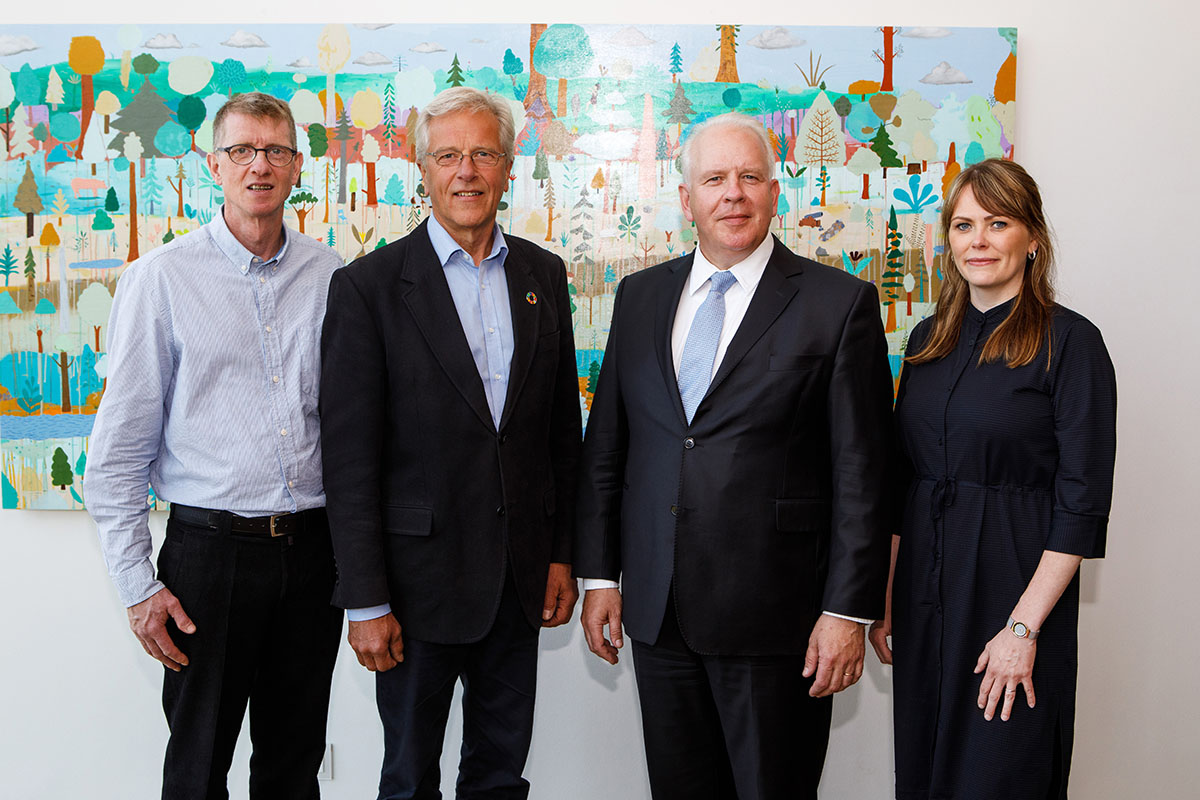
From left to right: Einar Gunnarsson and Reynir Kristinsson of Kolviður, Stefán Pétursson Chief Financial Officer of Arion Bank, and Hlédís Sigurðardóttir project manager for sustainability at Arion Bank.

In September 2019 Arion Bank became one of the founding members of a joint business and government forum on climate issues and green solutions called Green by Iceland. The role of Green by Iceland is to strengthen the partnership between the business sector and the government in order to reduce greenhouse gas emissions and to bring about carbon neutrality by 2040. The forum will also work with Icelandic companies to market green solutions internationally and to underpin Iceland's reputation as a global sustainability leader.
At the beginning of 2020 the Bank signed up for the challenge Hreinn, 2 og 3! organized by Green by Iceland, where companies are called upon to convert all their vehicles to 100% renewable energy. Under this initiative, the use of new corporate cars powered by fossil fuels will be discontinued by 2023. This will make Iceland a global leader in the use of environmentally friendly fuels. This is in line with our new environment and climate policy which states that no new vehicles will be bought from 2023 unless they run on 100% renewable energy.
Arion Bank signed the City of Reykjavík and Festa's Declaration on Climate Change in November 2015, and since 2016 we have published our environmental accounts. By signing the declaration companies pledge to reduce greenhouse gas emissions, reduce waste, measure what had been achieved and to regularly report on what they have accomplished. Since 2015 Arion Bank has been collaborating on environmental accounting with the innovation company Klappir Green Solutions and we have implemented a comprehensive software solution, Klappir Core, where information is streamed directly into the system from data sources. Klappir Green Solutions also affirm the Bank’s environmental accounts and publish a report which addresses the reliability of data.
A few facts about environmental issues at Arion Bank
- Employees have been able to apply for transport allowances ever since 2012. Arion Bank does its utmost to improve the health of its employees and to reduce greenhouse gas emissions from vehicles through its transport policy. The objective of the policy is to encourage employees to use environmentally friendly and efficient means of transport more. Environmentally friendly transport refers to all modes of transport used to travel to and from work other than private cars, e.g. walking, cycling, getting a lift from others or using public transport. In 2019 around 25% of employees used the transport allowance for some part of the year.
- We have significantly reduced our use of non-disposable plastic through measures such as improving processes in the canteen at headquarters and by introducing water coolers and multi-use glass bottles. We have also reached agreements with a number of suppliers to ensure that our supplies are received in multi-use rather than single use containers. We will continue to work on reducing the use of non-disposable plastic in 2020.
- The majority of our fleet of vehicles is now electric.
- We have run a campaign in our canteen to raise awareness of food waste and all leftover food is measured on a daily basis. This campaign has brought excellent results.
- We encourage our customers to think twice before printing out e-mails from us and we encourage them to decline printed account statements.
- Arion Bank’s vehicle financing team offers a 50% discount on borrowing fees for eco-friendly vehicles. By offering better terms for buying eco-friendly vehicle, Arion Bank is motivating its customers to use more energy efficient modes of transport and thus to cause less pollution.
- The Bank’s credit rules state that sustainability must be taken into account as far as possible when evaluating loans. Sustainability refers to corporate governance at companies and their impact on the environment and society.
- Institutional Asset Management at Arion Bank has mapped and analyzed all companies listed on the main market of Nasdaq Iceland with respect to their performance in terms of sustainability and social responsibility, including environmental and climate change issues.